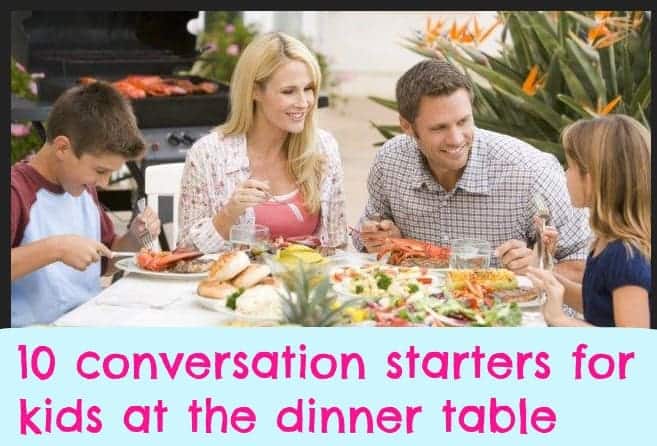This post may contain affiliate links. Please read our disclosure policy.
I think that you are going to love these 10 Tips to Get Your Kids Talking because it is so important to spend time just talking to your kids (and listening to them!)
Another day. Another silent drive home from school. “How was your day?” was met with grunts and shrugs. Any further attempts at conversation are met with ear buds and eye rolls.
Family dinner is supposed to be a bonding activity, a time to check in and connect. Instead, it’s full of arguing over the last piece of pizza and debating who’s in charge of loading the dishwasher tonight.
Toddlers and preschoolers can talk non-stop. Constantly wondering about the world and a desire to share every little detail with the parent they adore. But, as kids grow, communication becomes more challenging.
With the monotony of the school day and the natural shift of placing more importance on peers, families can grow apart…almost forgetting how to talk to each other!
If your family is stuck in a communication rut or not sure what to say, here are some tips to get you back on track.
10 Tips to Get Your Kids Talking
-
Open-ended questions: Phrase your questions in a way that makes your child have to think about their response, instead of giving a “yes” or “no” answer. Try: “What did you do in gym today?” or “What is the topic of your next book report?”
-
Ask for more details: If you get a one-word answer or a vague response, follow up with another question or observation. “What was your favorite part?” or “How did that make you feel?” or “Wow, that sounds awesome! Then what happened?!”
-
Make observations: Pay attention to your child’s moods, their habits, interests and friends. Then, use this as a starting point for conversation: “You looked like you were really having fun out there tonight!” or “Sam hasn’t been over in a while, what’s up?”
-
Learn about their interests: Notice things that your child enjoys, projects they create, books they read, movies they watch. Be genuinely curious. “Tell me about your newest lego creation” or “Have you seen any funny cat videos lately?”
-
Keep an open mind: Encourage communication by keeping your responses in check. If you freak out, overreact or rush to judgment when your kids come to you with challenges, they will not trust you enough to share future problems or concerns.
-
Stay focused: Once you get your child talking, it’s important to give them your attention. Resist the urge to text, check your phone, or flip channels on TV. It’s ok to have siblings wait their turn for your attention. You might reply, “One minute please; Henry was finishing a story.”
-
Listen: Sometimes it’s hard stay quiet while your child is talking. Often, a solution seems obvious or a fact seems to need correcting. Instead, focus on what your child is telling you, then give a short paraphrase back to let them know you’re listening.
-
Use non-verbals: Some kids will shut down if they’re bombarded with questions. Instead of talking, use non-verbal gestures (head nod, leaning forward) and small sounds (“mmm” or “oh”) to keep the conversation moving forward.
-
Talk Less: Some children are slow processors. Give your child time to answer before jumping in with another question or jumping to conclusions. Sit together in silence, leaving room for your child to start a conversation or ask a question.
-
Be available: Many kids pick the most inopportune time to open up. If your child is ready to talk, do what you can to be present for them at that moment. Listen for a few minutes, then agree to follow up at a time when you can give them your full attention.
Changing patterns takes time. If your family has “forgotten” how to talk to each other, it might take practice before talking and listening become second-nature again. It might be uncomfortable for everyone at first. And that’s ok. But with patience and persistence, your family can find that connection again!

















